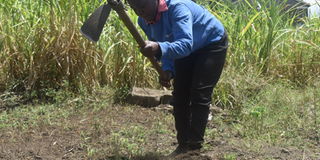Unpredictable rains leave farmers in Sobea, Baraka, Njoro and Ngata at a crossroads

Lucy Mboni a farmer in Nakuru also tills people's land as a way to earn a living.
At this time of year, James Hitler, a farmer at Baraka Estate, would be admiring the first sprouts from the crops planted on his farm.
Instead, he is still ploughing and weeding as he waits for the rains to arrive.
He says the unpredictable weather has become more of a threat to their livelihood.
"Ideally, by the beginning of March, most of us would have already planted our various crops and this is usually followed by rains that last for most of the month and this gives our crops a good base to germinate and grow," said Mr Hitler.
As Mtaa Wangu made its way through the areas of Sobea, Ngata and Baraka Estates, this is exactly what is happening with many of the farmers busy with last minute preparations to get their farms ready for planting.

James Hitler a farmer in Nakuru, Baraka tilling his land.
According to Mr Hitler, the rains have been unreliable for the past two years. This year it had rained sometime between January and mid-February, which was very unlikely, but as a farmer he took the time to prepare his land and plant some maize, which later never grew because the rains stopped.
"It has been raining for a week now and we are praying that it will continue so that our crops can grow. This year I am going to plant maize, beans and some cabbage and I hope they will do well," he says.
Elsewhere, we meet Lucy Mboni, who is taking a break from work and is sitting with her 3-year-old child as they eat lunch.

A farm along the Nakuru-Eldoret highway that has been prepared for the planting season.
As well as being a farmer, Lucy also depends on being hired by those who want to hire her to work their land.
"I usually charge Sh300 per metre of land I work, so it depends on the size of the land. I am very flexible and we go where the work takes us. Njoro, Ngata, Rongai are just some of the places we would go to till large tracts of land," said Ms Mboni.
From their point of view, business has been declining in recent years. This is because the weather has become unpredictable.
"The regular clients I used to have rarely call these days because they are not sure that if they hire me to till their land and plant their crops, the rains will be sufficient to allow growth and therefore they would not be willing to pay me for a result that is not guaranteed," she said.
She has had to find other work to support herself and her child.
"I come from Njoro, Piave, and most of the people who live near the Ndurugo River depend on this water to irrigate their vegetables. This somehow helps to protect them from the adverse effects of climate change," she said.
